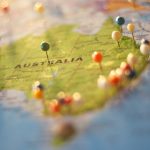Why I am a boat person
“Boat Person” has become a sinister term in recent times. Shane Conroy invites you to join a visual petition by uploading a “selfie”, holding an ‘I Am A Boat Person’ sign, to his campaign website.
I was born male, middle class and white. These three simple facts have secured me an easy ride in Australia. Sure, I’ve worked hard. I graduated from university; I put in long hours behind a desk; I even eat all my broccoli.
Still, life’s pretty good. I’ve never been denied anything because of the colour of my skin. I’ve never been faced with the working end of a gun because of whom I choose to call God. I’ve never witnessed my suburb bombed because a foreign government wants my oil.
And for my humble toil I’ve been richly rewarded. My stomach is full, my back is clothed and my head is sheltered. I’m free to worship whomever I want, say whatever I want, and go wherever I want. That puts me in a very privileged global minority.
It also places me in an entirely different reality to the many millions who do know the language of war and want. So, when I sit before my big-screen TV to watch the nightly news, perhaps it is unreasonable to expect me to relate to the passengers of leaky Indonesian fishing boats who I watch arrive on the shores of my freedom-loving country.
Since the children overboard fallacy almost 15 years ago, the media and political narrative has indoctrinated me to believe that ‘boat people’ are most likely to be illegal terrorists who gleefully destroy their identifying documents and hide their secret wealth in a mass plot to hijack our social welfare system and steal my tax dollars.
They are not Afghan Hazaras fleeing Taliban warlords, or dispossessed Iraqis escaping decades of war, or vulnerable Sri Lanka Tamils desperately seeking safety from genocide. They are not loving fathers, protective mothers or terrified children. They are merely boat people.
The same term was used in the late 1970s to describe the Vietnamese and Cambodian refugees who fled to Australia following the Vietnam War. The faces may have changed, but the message remains the same. I need not understand the complex geo-political conditions that have made their journey here necessary, or the nature of the persecution they hope to escape. All I need to know is that they pose some kind of murky, undefined threat and that I must vote to ‘stop the boats’ at all costs.
But it’s not that simple. Not even close. As long as we choose to deny asylum seekers safe pathways to resettlement in Australia, the boats will not stop and people will continue to die at sea. If we’re to finally engage in a mature, fact-based public debate about how we can achieve a solution that produces genuinely humane outcomes, we must retire old stereotypes and demand more than populist slogans from our politicians.
That’s the central idea behind the I Am A Boat Person campaign. It asks people to join a visual petition by uploading a selfie holding an ‘I Am A Boat Person’ sign to the campaign website. The images will be collected and presented en masse to politicians around the country with a request to change the negative language they use when talking about asylum seekers.
I, for one, find myself in this country by way of an Irish convict who sailed here to serve hard time for possession of ill-gotten goods. I believe that qualifies me as a boat person, and by counting myself amongst Australia’s many boat people, I am helping to remove the discriminatory power from the derogatory tag and lift the stereotype that obscures our view of the issue.
Just as the ranks of gladiator slaves stood to the protect Kirk Douglas from the soldiers of the Roman Empire with the cry ‘I am Spartacus’ in Stanley Kubrick’s classic 1960 film, so too can we rise together as a country of boat people in an inclusive spirit that acknowledges the individual humanity and unique situations of the vulnerable people who seek our protection.
Get on board at www.iamaboatperson.com. It’s better than broccoli.
Shane Conroy is a freelance journalist and the communications director of I Am A Boat Person Inc. He writes for a range of publications and is currently working on his first book. Despite persistent rumours, he actually likes broccoli. Tweet him at @ShanePConroy.












